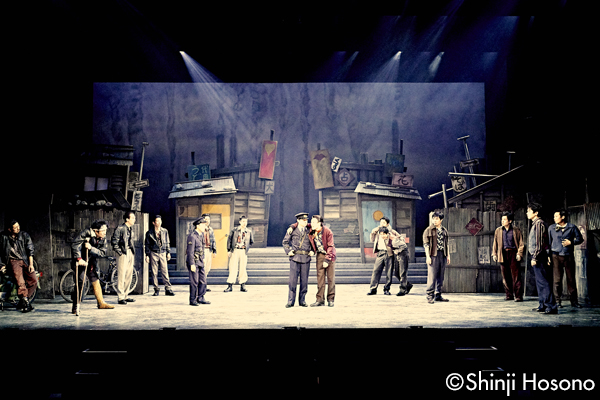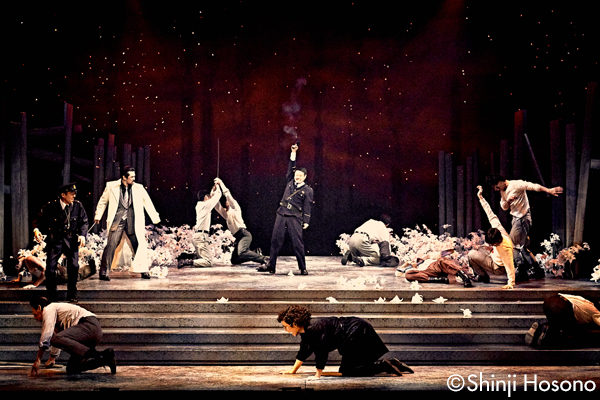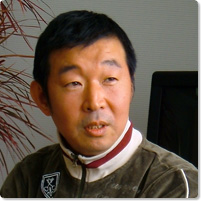

Crying Romeo and Angry Juliet (Feb. 8 – Mar. 4, 2020 at Bunkamura Theatre Cocoon)
Photo: Shinji Hosono
Data
:
Premiere: 2020
Crying Romeo and Angry Juliet

Born in 1957 in Himeji city, Hyogo Prefecture, Chong is a writer and director. Quitting the Literature Dept. of Doshisha Univ., he studied in the Art Dept. of the Yokohama School of Broadcasting and Cinema (present Japan Academy of Moving Images). After working as an art assistant at the Shochiku film studios, he joined the Black Tent Theater company.
The Shinjuku Ryozanpaku Theater company was created together with members of his own generation. Today he is active as a freelance writer and director. While writing plays for Bungakuza, Opera Theater Konyakuza and other theaters, he founded the production group “Umi no Circus” in 1992 and served as writer and director, presenting sadly comical plays about the subtleties of life. In 1993, he won the 38th Kishida Drama Award for The Terayama. He also became active as a film scriptwriter, winning the Asahi Film Contest Screenplay Award and the Kinema Junpo Film Award for the screenplay Tsuki wa Docchi ni Deteiru along with other awards. In 1998, he won numerous awards for Ai wo Kou Hito, including the main prize of the Kinema Junpo Film Awards, the Japan Academy Award for Best Screenplay, the 1st Kikushima Ryuzo Award and the Asia Pacific Film Festival Best Screenplay Award. He enjoys popularity writing scripts for TV and radio, having won the Grand Prize of the 2001 Geijutsu Festival for Boku wa Ashita 18 ni Naru (2001/NHK television). In 2008 his play Yakiniku Dragon was produced by the New National Theatre, Tokyo as a joint Japan-South Korea production, presented again in 2011 and 2016, and was also restaged in Seoul, ROK in 2008 and 2011. This play won him the 16th Yomiuri Theater Grand Prix award for Best Director, the 12th Tsuruya Namboku Drama Award, the 43rd Kinokuniya Theater Award and the 59th Geijutsu Sensho Minister of Education, Culture, Sports, Science and Technology Award. In spring of 2014 he was awarded Japan’s Medal of Honor with Purple Ribbon.
https://www.lespros.co.jp/artists/wishing-chong/


Crying Romeo and Angry Juliet (Feb. 8 – Mar. 4, 2020 at Bunkamura Theatre Cocoon)
Photo: Shinji Hosono
Data
:
Premiere: 2020
Act I
The setting is a number of years after the end of the Pacific War. Here in the setting’s “Verona,” a turf war is being waged by two gangs, the Capulets, a newly revived Japanese yakuza gang, and the Montagues, a group made of foreign postwar residents of Japan led by Korean nationals.
Late at night Juliet arrives at a wharf on the outside of town, having come from the outlying countryside to start a new life in the city at the invitation of her older brother, Tibalt. Come to meet Juliet is Tibalt’s common-law wife, Sophia. Juliet tells Sophia that she has had bad luck with men and wants to her life anew.
Tibalt lost a leg in the War but it doesn’t keep him from following the leader of the Capulet gang he adores, Roberto, in a life full of street fighting. Sophia is worried about the changed man her husband has become.
Romeo, a reformed former Montague with a stutter, has started a small business at an outdoor stall under the girder bridge in front to the “Paektu Mountain” Eastern medicine clinic, where he sells shochu liquor. He is leading a life without any hopes for the future, and he has two childhood friends named Mercutio and Benvolio. The level-headed Benvolio and the earnest Romeo do their best to clean up the trouble that the feisty Mercutio is always getting into.
From Lawrence at the clinic, Romeo has been warned that he should stop associating with his no-good friends, but still finds himself being led off to a dance hall by them, and it is there that he happens to meet Juliet.
To Romeo’s complaint that finding hope in a town like this is tougher that try to find a ring you lost in and endless beach of sand, Juliet replies encouragingly, I think you can find it too.” The two fall in love at once and swear eternal love up on a platform for hanging laundry.
Sophia asks Tibalt what makes him so desperate to rusk headlong into life so recklessly. Tibalt tells her the hellish truth of his unspeakable war experience of having to kill his own sick and wounded comrades and young foreign recruits at the order from his commander that, “Soldiers who can’t keep fighting should die.”
As the Montagues and Capulets watch, a one-on-one fight begins between Mercutio and Tibalt. Romeo tries to intercede, but Mercutio is stabbed by Tibalt. In a flashback to his horrible war experience, Tibalt gives out a heart-wrenching shout. Seized by anger, Romeo moves to cut Tibalt back, but in that instant, Tibalt grabs Romeo’s hand and drives the dagger into his own chest laughing in cynical irony as the life leaves him.
The siren of a police car is heard, and everyone scatters, but Romeo stands petrified and crying as Benvolio comes to embrace him.
Intermission
Grasping pictures of their deceased husbands, a group of war widows passes by singing and dancing as if possessed. In her black funeral dress, Sophia wails in agony.
Sophia
Act II
Juliet, despite knowing that Romeo was her brother’s enemy, she embraces him, and the two lovers spend their first night together up on the laundry-hanging platform. Now being wanted by the police, Romeo is helped by Lawrence to flee the town. Angry to know that Romeo has been joined in love with the younger sister of the man who killed Mercutio, Benvolio presses him for an explanation.
Meanwhile, in order to pay off the deceased Tibalt’s debt, Roberto plans to have Juliet work as a barmaid at a café. When Juliet goes to Lawrence for help, he gives her a potion that will make her appear to have died and promises to arrange for her to be able to flee with Romeo when she awakes from the coma.
Acting as Lawrence’s messenger, Benvolio tells Romeo of Juliet’s death and hands him some real poison that he has stolen from Lawrence and tells him to join her in the next world. As he burns Lawrence’s letter explaining the Juliet is not really dead, Benvolio stares into the flames and says, “I’m going to live on, I’m going to live and see what comes of this country’s future.”
As Sophia and her friends are conducting Juliet’s funeral service, Roberto and the Capulets burst in, armed with sickles and Japanese swords. When the polices fire warning shots to try to stop a brawl, it triggers a ruthless blood-for-blood rumble.
Rushing onto the scene of what he believes to be the dead Juliet’s funeral, Romeo drinks the poison and collapses to the ground. When she awakes from her false coma, Juliet sees the lifeless body of Romeo, picks up a fallen knife and buries it in her own chest and dies.
The sight of the bodies of Romeo and Juliet causes a renewed uproar. “It’s all the doing of the Montagues,” shouts Roberto to falsely justify his cause as he takes the lead in a new round of fighting. Amid shouts of “Kill them!” “Kill!” a new round of bloodshed ensues, while from the distance we hear marching footsteps of the soldiers of the War everyone thought had ended.
Into the brawl walk Romeo and Juliet, dressed in pure white and leading Tibalt and Mercutio behind them. Falling dust blackens the clothes of the would-be bride and groom as they gaze into each other’s eyes and the stage goes dark.
The marching sound of soldiers at war grows louder and louder.
Related Tags